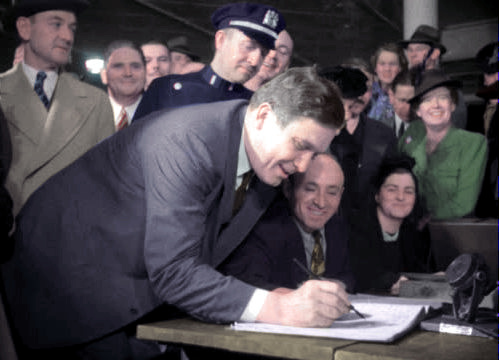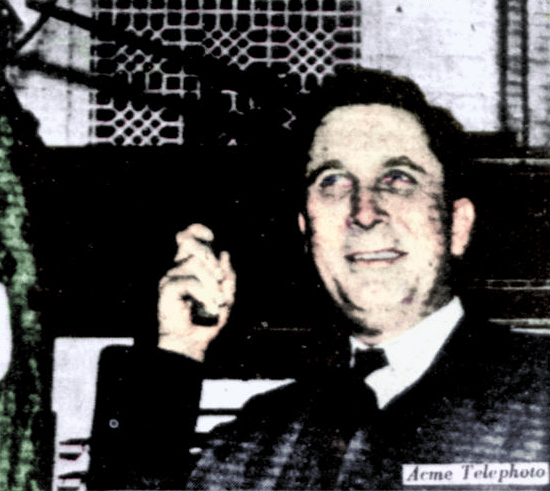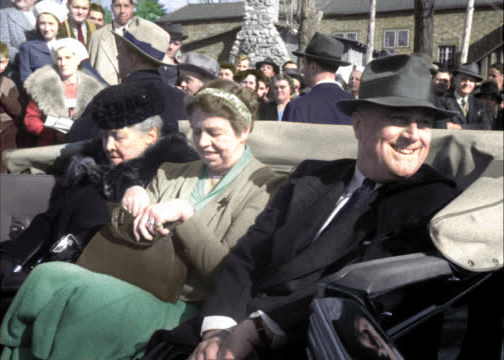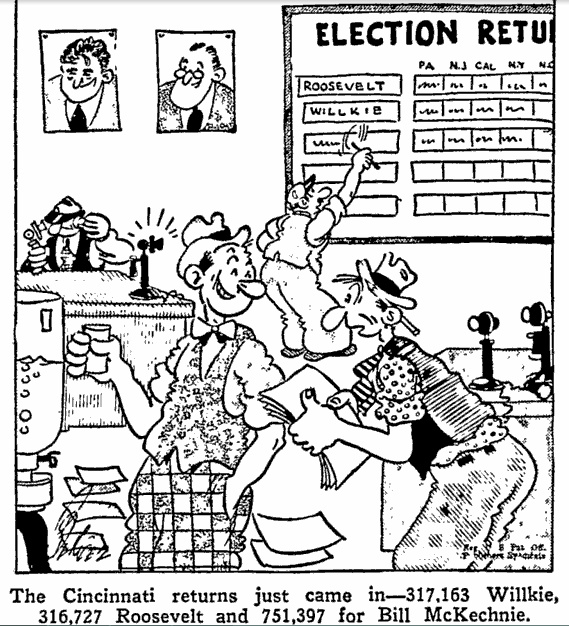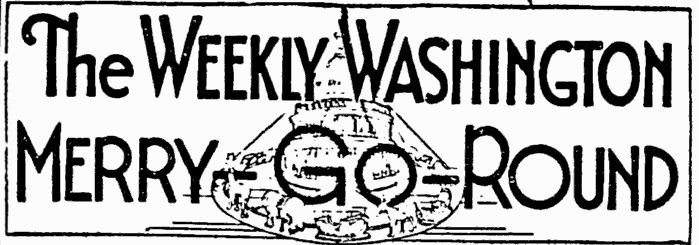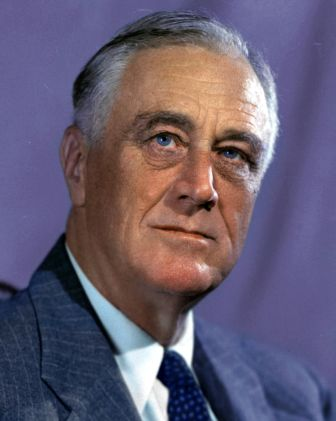VOTERS RUSH TO POLLS
Record Turnout Likely In Nation
…
WAR ISSUES SHARES MAJOR INTEREST WITH THIRD TERM
…
Congressional Control Also at Stake; Extremely Close Vote Anticipated
…
60 Millions Registered
By Lyle C. Wilson, United Press Staff Writer
New York, Nov. 5 –
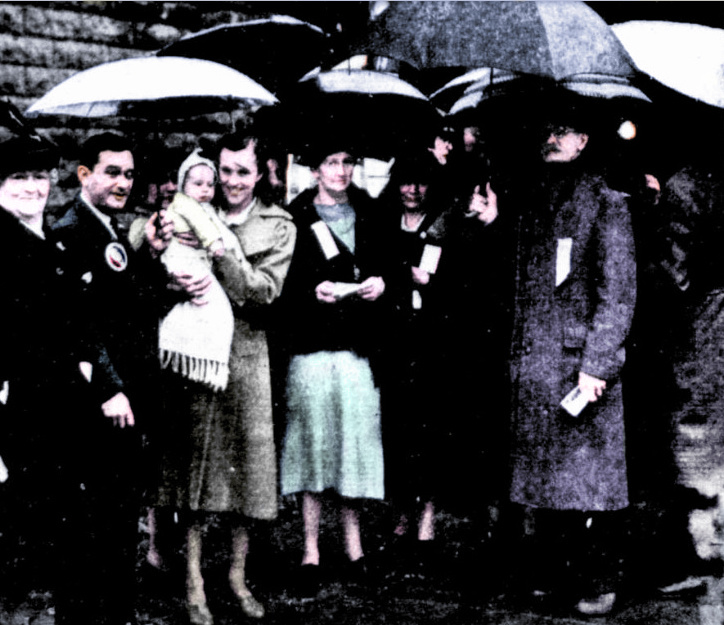
Lines of citizens stood before almost every polling placed in Allegheny County today, waiting their turns to cast their ballots. Rain, which fell intermittently, failed to discourage the voters. Even a tiny baby did not keep Mr. and Mrs. Alexander Roberts, shown near the left in the above picture, from doing their duty as citizens. They took their son, Edgar, age 3½ months, with them to the polling place for the 19th District of the Fourth Ward, located in a garage in Parkview St.
The unprecedented issue of a third term went to the people today.
They are choosing between Franklin D. Roosevelt and Wendell L. Willkie for President of the United States.
Stirred by political dispute as it has not been since 1916, the nation has registered 60 million voters and the largest poll in history is expected.
President Roosevelt himself went to the polls in Hyde Park, N.Y., Town Hall and cast his ballot at 12:20 p.m. (EST). He was preceded by a few hours by Mr. Willkie. The Republican candidate cast his vote at a public school polling place in New York City at 9:42 a.m. (EST).
Weather Aids Vote
Most early returns were from normally Republican territory and could not be regarded as significant.
Summer weather throughout the country, with only occasional showers in some sections, helped swell the vote.
“I urge every citizen to vote, irrespective of how he votes,” Mr. Willkie told reporters as he entered his precinct polling place with Mrs. Willkie. His voice was hoarse and she showed the strain off one of the most strenuous campaigns in the country’s history.
The President signed the Hyde Park poll book as No. 292 and became a little impatient when photographers kept popping their flash guns around him.
Sharon, N.H., First
“Let’s go and vote,” Mr. Roosevelt said, moving away with his wife and mother. Mrs. Roosevelt was No. 294 in the balloting and the aged Sarah Delano Roosevelt was No. 293.
Sharon, New Hampshire, was the first town to report its results. It went for Mr. Willkie, 24 to 7.
Republicans are battling not only to win the White House but the House of Representatives. Some political forecasters believe the Presidential election may go one way and the Congressional choice another.
There are 36 United States Senators to be elected, but it is a mathematical certainty – because of Democratic strength in Southern states – the Republicans cannot win the Upper House.
All House Seats Up
The seats of all 435 members of the House were at stake this year. Maine elected her three-member delegation last September so that 432 seats are to be filled today. The representatives from Maine are Republicans.
35 gubernatorial elections were carded but Maine and Louisiana already have made their choices, leaving 33 to be elected today.
The presidential contest promises to be the closest in popular vote since 1916 when Woodrow Wilson defeated Charles Evans Hughes by a plurality of approximately 600,000 votes. But the electoral vote could be lopsided either way despite a close popular vote.
_Roosevelt Favored
Polls and surveys have demonstrated as nearly as they can that the big industrial states of the middle East and lake regions are a battleground where the election will be won or lost.
The final betting odds favored Mr. Roosevelt, evidently because most observers believed he could drop one or more of the big states – even New York with its 47 electoral votes – and still win with his backlog of Solid South support. Mr. Willkie probably mist take all the industrial states to win.
This angriest campaign in recent times shortly after midnight with Mr. Willkie’s final appeal for support, broadcast from coast to coast.
Closes With Prayer
President Roosevelt had just left the air. He had spoken from his Hyde Park, N.Y. home.
From both came solemn promises to safeguard the nation’s peace and pleas for national unity in a world aflame. Both are voting today, part of the vast polling army.
President Roosevelt closed his campaign with a prayer:
Almighty God…bless our land with honorable industry, sound learning and pure manners. Save us from violence, discord and confusion; from pride and arrogance and from every evil way. Defend our liberties…justice and peace at home…obedience to thy law…in time of prosperity, fill our hearts with thankfulness, and in the day of trouble, suffer not our trust in thee to fail. Amen.
Pledges No Fourth Term
He had pledged again that he would not seek a fourth term and in the last hour of the last day before the election, he sat at home with his family and reminded the people that they are at peace, free to live their ordinary lives, to do and say and worship as they please.
Tomorrow of all days, they will be free to choose their own leaders. In our polling places there are no storm troopers or secret police to look over our shoulders as we mark our ballots.
After the ballots are counted, the real rulers of this country will have had their say. After the ballots are counted, the United States still will be united. There can be no arguments about the essential fact that in our desire to remain at peace by defending our democracy, we are one nation and one people.
Willkie’s Last Plea
Mr. Willkie spoke during a midnight to 1 a.m. rally at the Ritz Theater here.
I cannot say anything to you about how well I have led this crusade. But I can say this to you, that no man in history has ever felt a deeper sense of obligation to the cause he has lead than I do at this time.
We believe this cause is the most sacred cause in the world, the preservation of the free life in America. And that free way of life can be preserved only if we become a united people. We must win, we must win this cause. I call upon you and the millions of other Americans to carry this crusade to the point where we can again preserve the liberties of the country.
Willkie Gets First Votes
Mr. Willie was making his last bid for support of the people and his appeal overlapped the first election returns. Representative Joseph W. Martin Jr., Chairman of the Republican National Committee, checked the G.O.P. program for a moment to announce the tabulation of the first little bundle of votes. Sharon, N.H., with polls open at the stroke of midnight had completed and tabulated the canvas in five minutes.
The first returns:
Willkie, 24; Roosevelt 7.
Sharon has gone Republican before:
Hoover 11; Roosevelt 1 in 1932.
Landon 13; Roosevelt 3 in 1936.
But the tiny New England community apparently properly reflected the nation’s determination to cast more votes this year than ever before. Forty years ago, the presidential poll aggregated approximately 14,000,000 votes. Four years ago, nearly 45,500,000 were tabulated.
Both Sides Confident
Through the final hours of election eve, the presidential candidates campaigned, expressing confidence of victory and firing last minute salvos of protest against the misrepresentation of the opposition.
Hitting hard at what they believe to be the weak spot in Roosevelt’s defense, Republican campaigners from coast to coast drummed the third term issue and the Democrats drummed right back. There never was such a hookup of radio facilities for political purposes as in the final three hours. The stage and screen, the arts and sciences contributed spokesmen to both sides. Bing Crosby spoke for the anti-Roosevelt forces in Hollywood. Walter Huston was master of ceremonies of those for a third term.
There were pickups here and in Washington with the hot bands of Count Basie and Benny Goodman beating out a Roosevelt tattoo from Carnegie Hall, New York.
Third Term Is Issue
Third term – third term – third term. That was a Republican refrain. From Washington, Senator James F. Byrnes (D-SC) made the Democratic answer.
He told the 10 p.m. to midnight Democratic radio audience:
Far more fundamental than the custom of no third term is the custom that no man shall be elected President without previous experience in state or national public life. This custom is so deeply embedded on our political institutions that prior to this year it has never been challenged.
Before the solemn moment of his final radio appeal as a presidential candidate, Mr. Willkie sharply complained that his political opposition had “attacked me with a smear campaign designed to make you question my record and my motives.”
Roosevelt Complains
Mr. Roosevelt was abreast of that with equally sharp objection to “misrepresentation” which he said Republicans had undertaken to persuade civil servants that legislation would be put forward to jeopardize their pension position.
*Elect Willkie!" urged veteran liberal Senator Hiram W. Johnson, CIO President John L. Lewis, one-time Democratic presidential nominee Al Smith, heavyweight champion Joe Louis, crooner Crosby and Mary Pickford in the G.O.P. radio program.
“Roosevelt!” begged Secretary of State Hull, columnist Dorothy Thompson, poet Carl Sandburg, movie sitar Joan Bennett.
Some of the political rally debaters spoke but briefly, some were bitter.
Said boxer Louis:
I’m for Mr. Willkie because I think he’s going to be good for the colored people of our country… I believe Mr. Willkie’s a regular fellow and a real fighter. He can take it all right – and he can dish it out.
Lewis Fears War
Said labor leader Lewis:
I assert again that the re-election of President Roosevelt will result in the nation’s involvement in war… To the men and women of labor, and to all Americans who have any confidence in my opinion, I say, let us put our own house in order, let us free America from the menace of internal dictatorship.
Brown-derbied Mr. Smith and Lewis W. Douglas, first New Deal budget director, spoke on behalf of Democrats-for-Willkie. The one-time Governor of New York asserted that continuation of New Deal policies would depress government bonds. The administration, he charged, “is doing its best to destroy” the wealth of “tens of millions of ‘forgotten men’.”
Said Mr. Douglas:
I have been a Democrat all my life. I believed in the Democratic Party because for me it was the party of freedom. I no longer can believe it. I do not believe that the present administration is indispensable. There, there is no reason for us to allow one man to overturn a keystone to American democracy by giving him a third term.
Dewey in Cleveland
District Attorney Thomas E. Dewey of New York, defeated by Mr. Willkie in June for the Republican presidential nomination, said in Cleveland that the Chief Executive is “adopting the very arguments of his opposition” and has been employing arguments which are “positively” Republican.
The Hollywood microphone was switched on to pick up Mr. Crosby’s assertion that he is “against the third term and plenty of other people out here are too.” He named Clark Gable, Jimmy Stewart, Frank and Ralph Morgan, and numerous others as screen stars who thought Mr. Willkie should replace Mr. Roosevelt in the White House.
Representing the world of screen and stage on the Democratic program, in addition is to Miss Bennett, Goodman, and Basie, were tap dancer Bill Robinson, author-critic Alexander Woollcott, actors Walter Huston, Melvyn Douglas, and Douglas Fairbanks Jr. and songstress Gertrude Niesen.
McNary Adds Voice
Senator Charles L. McNary, G.O.P. vice presidential candidate, said from his Salem, Oregon home that the fate of the nation for the next four years rests in the hands of the people, and called upon them to consider the gravity of the situation they face, He urged voters to “manifest your faith tomorrow” by “first getting out the vote.”
In Washington, Democratic vice presidential candidate Henry A. Wallace closed his drive for the farm vote and said that re-election of Mr. Roosevelt was essential for American peace.
He said that the New Deal succeeded in saving the farmer after foreign markets were reduced or shutoff and praised the surplus food administration and initiation of the food stamp plan.
Under-Secretary of State Sumner Welles, in a radio speech in Baltimore, termed Republican attacks upon Mr. Roosevelt’s foreign policies “contemptible and unpatriotic.” He vigorously denied Republican assertions that the administration had entered into secret commitments with foreign governments.

